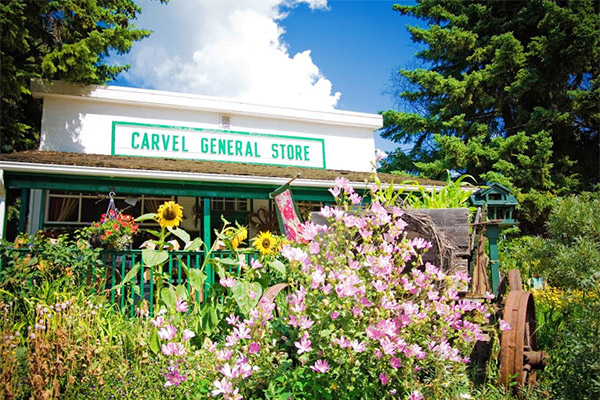
Have you ever wondered why moose doesn’t pluralise to meese like goose does to geese? That’s because they have different roots! Moose is actually an Abnaki word, while goose comes directly from ‘ghans-‘, a Proto-Indo-European word that was likely imitative… meaning people squawked like a goose and that’s what they called it. There are some unique place and family names out there. They all have different origins, and they can often be tricky to pronounce. We’ve gathered up a list of really cool places in the Tri-Region area with equally cool names!
Marlboro
Accessible by Spruce Grove’s trails, the Marlboro Off-Leash Dog Park is an unfenced expanse, and the perfect spot for your dog to run to their heart’s content. There are plenty of forested trails in the area too, so it’s the perfect spot in town to walk.
Did You Know:
The word Marlboro, simplified from Marlborough, takes its roots from ‘marl’, meaning ‘girl’ in Old French, and ‘borg’, meaning ‘city’ or ‘fort’ in Old Norse, which in turn comes from the Proto-Germanic ‘burgz’, meaning the same thing. It shares the same roots as the Old English word for mountain, ‘beorg’, and similar roots as ‘barrow’.
Wilhauk
Spruce Grove’s own Wilhauk Beef Jerky is Alberta’s best beef jerky! Seriously. Wait, did we say Alberta? Yeah, we meant Canada. It makes an excellent summertime hiking snack, stocking stuffer, or souvenir to take home from your Tri-Region adventure.
Did You Know:
The family name ‘Wilhauk’ likely originates from ‘Will’ and ‘Hawk’. Will is short for a variety of germanic-origin names, such as William, Willem, and Wilhelm. They mean ‘resolute protector’, and are heavily related to the word ‘will’. Other short forms include Liam and Bill. A very common French variant is ‘Guillaume’. Surnames can come from a wide variety of different sources, including a father’s name, a noteworthy action, your ancestors’ location of residence, a community, a nickname, or a profession. If your name is Smith, you likely had an ancestor who smithed! Keeping that in mind, ‘Wilhauk’ may have originated as both a nickname and from the profession of falconry.
Oppertshauser
In Stony Plain, the Oppertshauser House is within the Multicultural Heritage Centre. It is a living museum that recreates an early 1900s lifestyle and was built in 1910 by settler Henry Oppertshauser, who also owned a large hardware story that now houses the ATB downtown.
Did You Know:
Oppertshauser is the family name of the German family who owned the house. It comes from ‘oppert’, a Dutch verb meaning to bring stones or mortar to the masons, and ‘haus’, meaning house in German. The ‘-er’ suffix added to the end of ‘haus’ changes the meaning to someone who houses, like a host or protector.
Shikaoi
Shikaoi Park is located right next to Stony Plain’s town hall, and is a beautiful Japanese garden with a pond, gazebo, and seating. It’s tree sheltered, and the perfect spot to sit back and relax with a good book.
Did You Know:
The name ‘Shikaoi’ means to follow and hunt deer. The park is named after Stony Plain’s sister community in Japan. The relationship was established in 1984, and has led to cultural diversity for both towns. There are student exchange programs, long stay programs, and other opportunities.
Carvel
Parkland County’s Mayor is one of the very few residents of the hamlet of Carvel. Check out the CWHK Weather Radar Station, central Alberta’s main weather station.
Did You Know:
Carvel’s namesake comes from a novel, Richard Carvel, written by Winston Churchill. No, not that one. In fact, the author of the novel was American, and had no relationship with the British prime minister. It sold exceptionally well when it was published in 1899 (approximately 2 million copies sold), and is still being sold today!
Chickakoo
The Chickakoo Lake Recreation Area in Parkland County is one of the best hiking spots in the Edmonton area, with 14km of trails circling around a series of lakes and woodland. The park itself is approximately 200 hectares in size, so be sure to bring binoculars to spot the wildlife!
Did You Know:
The name ‘Chickakoo’ has been official since at least 1950 and first appeared on maps made by the original surveyors of the area, indicating potential origins in Indigenous languages.
We hope this guide helps you pronounce some of our local parks, attractions, businesses and places to visit, so you can sound like a local!
